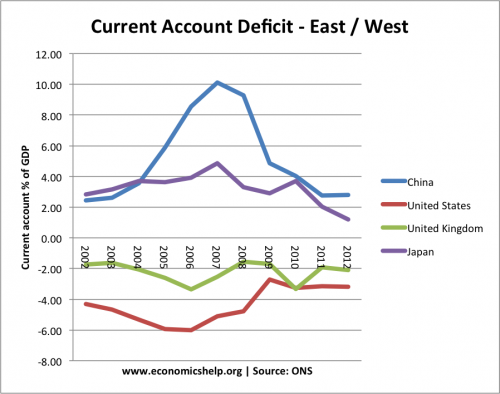Readers Question: 1. Does state capitalism as practised in China pose a fundamental challenge to the Western model of liberal-democratic capitalism?
No, I don’t think so. From a political perspective, no matter how economic successful China might be, there will never be any enthusiasm to replicate China’s one party political system. In fact, it is most likely to be the other way around. Increased economic living standards in China are likely to cause increased demand for political and democratic freedom within China; there is already growing resentment at corruption within the state apparatus. It make take a few years or a few decades, but it is China’s political system which will be challenged by its own economic success.
That’s enough on politics, what about the economics? Does China’s growth pose a threat or benefit to the rest of the world?
From an economic perspective, Chinese state capitalism has been successful in creating very high rates of economic growth over the past few decades. Depending on which measure of GDP you use, China is forecast to overtake US economy at some stage (though recent downward revisions to China’s growth may mean it doesn’t occur until the next century. But, nevertheless, the growth of the Chinese economy has been very significant and has many impact on the world economy.
Challenges from Chinese rapid economic growth
Increased price and demand for raw materials. The global recession of 2008-12 was unique in having a period of recession, but rising commodity prices. Usually, when the western economic go into recession, demand for raw materials falls, and therefore the price falls – cushioning the impact of the recession. However, this time, rising demand from China and Asia, meant in the recession, we saw rising commodity prices – making the recession more difficult. Over the medium term, China’s economic growth will put increased pressure on raw materials and push up oil and other commodity prices. There will be greater competition for limited supplies of raw materials
- However, this will spur the Western economies to increase fuel efficiency and look for alternatives to fossil fuels, which in the long term is desirable.
Environmental challenges. As Chinese GDP grows, there will be rise in greenhouse gases and other environmental costs, making it more challenging to deal with global warming.
- However, the biggest levels of pollution still come from Western economies.
Global imbalances from high saving rates. In the boom period of 2000-2007, China experienced a large current account surplus. The Chinese kept their currency undervalued through using surplus foreign currency and purchasing US bonds. Arguably, these large capital outflows distorted markets. Artificially pushing down US interest rates contributing to a boom in US lending – and reducing US exports through keeping the dollar overvalued.

- However, these global imbalances have been significantly reduced in recent years. The Chinese currency has steadily appreciated as the government have tried to contain inflationary pressures. This shows that Chinese growth can evolve from relying on cheap exports to more balanced with a growing middle class willing to spend and buy imports.
Lost competitiveness. China has gained substantial market share in many labour intensive manufacturing industries. This has caused many firms to become uncompetitive and go out of business. This has caused a degree of structural unemployment in the west.
- However, economies are always evolving with changing structural components of the economy. As the UK has lost manufacturing, it has tended to concentrate on service sector based industries, where the UK has more of a comparative advantage. The UK would probably have lost competitiveness in labour intensive manufacturing anyway.
Benefits from Chinese economic growth
- Cheap manufactured goods. The west has benefited from cheap imports of manufactured goods from China. This has helped keep global inflation low, and increased living standards as we have been able to buy more consumer goods.
- Export markets. With rising real GDP per capita, China has a growing number of middle class consumers who are able to buy western exports (or travel to the West to consume services, like higher education). Therefore, the growing wealth of China will have positive effects for the rest of the world.
- Technological development. With a population of 1.3 billion, China has a huge pool of labour capital. Increased economic growth has enabled greater education of this labour force. Because of this growing pool of skilled labour, there is a chance that China’s economy will increasingly produce technological innovations, benefiting from its large population and labour force potential.
- Overseas investment. The proceeds of growth have been invested overseas (including both short term and long-term capital flows). This gives China much greater political and economic sway over other countries. For example, China owns over $1.1 trillion of US bonds. China has also invested heavily in Africa. This has had many benefits, such as improved transport and infrastructure, which has contributed to economic development. But, on the other hand, China’s investment is tied to their use of raw materials in Africa
China’s growth slowing
This article shows the limits of the state capitalist model – China’s growth is slowing
- Stats on GDP are unreliable
- Growth has been financed by a boom in bank lending and investment, but now there is concern this boom is unsustainable.
- Reliance on low cost exporting industries may be less sustainable model in the long term.
- One child family means China will see a slowing population.
Related
